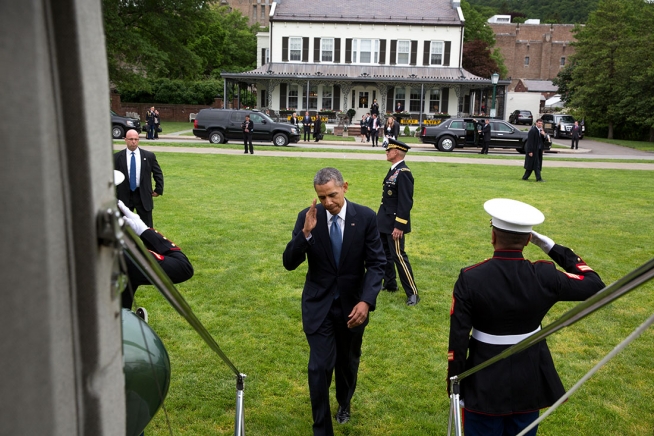Obama’s perfect policy storm in Iraq and implications for Australia’s neighbourhood
Posted By John Blaxland on June 17, 2014 @ 12:15
 [1]Developments in Iraq have sent shock waves around the Middle East, but the ramifications are global. With so many security challenges, and a particular aversion to conflict in Iraq, President Obama is unlikely to commit substantial forces there. Still, the United States and its allies will need to be wary of the repercussions elsewhere, including in Australia and Southeast Asia.
[1]Developments in Iraq have sent shock waves around the Middle East, but the ramifications are global. With so many security challenges, and a particular aversion to conflict in Iraq, President Obama is unlikely to commit substantial forces there. Still, the United States and its allies will need to be wary of the repercussions elsewhere, including in Australia and Southeast Asia.
With the surprise conquest of northern Iraq by the militant Sunni Group, the Islamic State of Iraq and al-Sham (ISIS), we’re effectively witnessing a clash between the Sunni and the Shia worlds. Iraq as a country is a Western construction—the product of the Versailles Peace Treaty of 1919 that split up the Ottoman Empire, leaving Sunni and Shia elements behind arbitrary straight lines in the sand in a way that failed to recognise that they’d always been at odds. Iraq’s former President, Saddam Hussein, was a Sunni who ruled with an iron fist, but the Sunnis in Iraq were primarily from the north and north-west of Iraq and were always only a minority in their own country.
The Shiite world is reeling from this Sunni assertion into the north and northwest of Iraq, but it doesn’t expect it to keep rolling to the Persian Gulf. The Iraqi Army has surprised many by its rapid retreat in the face of ISIS, but it’s Shia dominated and the ground it has ceded was always Sunni territory. Having come a long way south from Syria, ISIS is now entering turf the Shiites won’t want to back down over, so there’ll be a change in dynamics. In addition, in terms of the logistics of sustaining further operations it’s getting tricky for ISIS to sustain the momentum in its advance southwards so there’ll probably be a turn in the tide before an uneasy truce emerges that sees the land effectively divided into Sunni and Shia domains.
Iraq’s neighbours also have a stake in the outcome. Shiite Iran, for instance, has been bolstering Nouri al-Maliki’s position in Iraq. On the other side, Sunni supporters from Saudi Arabia and Qatar have been actively operating behind the scenes, pouring money into Sunni extremist groups of which ISIS is the latest manifestation. Iran and Saudi Arabia are the biggest regional stakeholders in that tussle.
As a prominent neighbouring country, Turkey also has a stake in developments, accentuated by the fact that Turkish diplomats have been detained by ISIS in Mosul.
Israel is focused on what’s transpiring as well. It has had conflicts with most of its neighbours before and is concerned about the outcome in Iraq.
This presents a perfect policy storm for the Obama administration. It’s in a conundrum. The whole saga of involvement in Iraq wasn’t Obama’s concern. He oversaw the withdrawal of American forces from Iraq and had no intention of returning. Iraqi President al-Maliki has requested air strikes from Washington. He may get those, depending on how much further ISIS progresses towards Baghdad. But no one is advocating seriously the commitment of major ground forces back into Iraq, particularly with no clear, savoury and viable alternative end-state on the horizon.
And in reality, the Americans aren’t in a position to recommit forces to the defence of Iraq. The global stakes are too high now. The dynamics of 2001 are no longer with us. The days of talking up the so-called ‘Global War On Terror’ are over. Obama declared as much last year. Terrorism is still a problem, but the bottom line is that Russia and China now pose a challenge if not a direct threat to the US that they didn’t in 2001. That fundamentally alters the geo-strategic equation.
President Obama is between a rock and a hard place. He’s facing challenges in East Asia, Southeast Asia, southern Asia, Europe and elsewhere and still has an economy that’s in the doldrums. The Chinese and Russians are acutely conscious of his predicament. Meanwhile, the complexity of the situation in Iraq means there are no easy answers on offer.
Consequently the US will probably let the ISIS campaign run out of puff. ISIS might get into Baghdad, but in essence, the Sunni territory that the Iraqi army was reluctant to defend has already been ceded to ISIS. The question now is whether this will be the new boundary between the Sunni and Shia worlds, in effect fulfilling Osama bin Laden’s dream of the establishment of a new Sunni caliphate.
Why should we care? Because even though it seems a long way away, the spawning of a series of al-Qaeda affiliates, with jihadists from places like Indonesia and Australia in the mix, means there are significant ramifications in store for Australia and its neighbourhood.
John Blaxland is a senior fellow at the Strategic and Defence Studies Centre at the Australian National University. His latest book, The Australian Army from Whitlam to Howard, discusses Australia’s involvement in the war in Iraq. Image courtesy of The White House [2].
Article printed from The Strategist: https://www.aspistrategist.org.au
URL to article: https://www.aspistrategist.org.au/obamas-perfect-policy-storm-in-iraq-and-implications-for-australias-neighbourhood/
URLs in this post:
[1] Image: http://www.aspistrategist.org.au/wp-content/uploads/2014/06/p052814ps-0973.jpg
[2] The White House: http://www.whitehouse.gov/photos-and-video/photogallery/graduation-united-states-military-academy-west-point-2014
Click here to print.